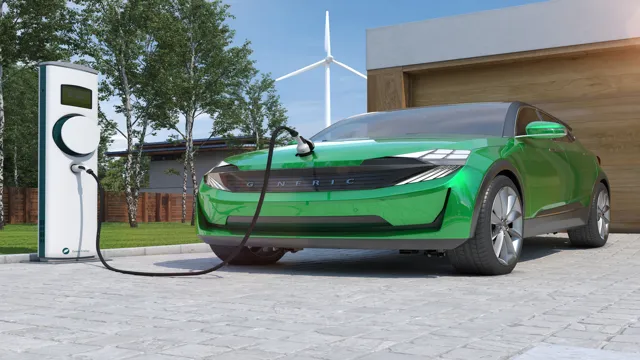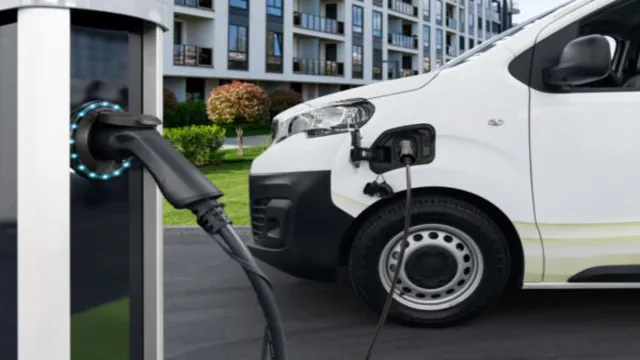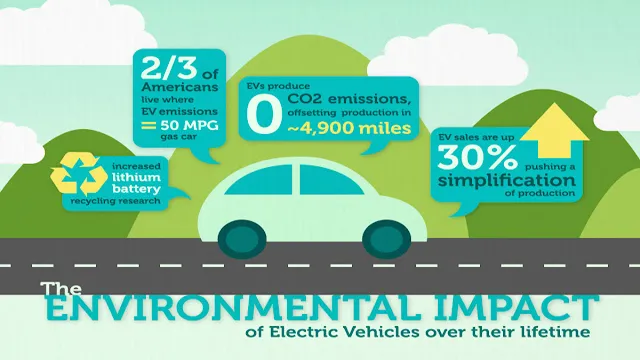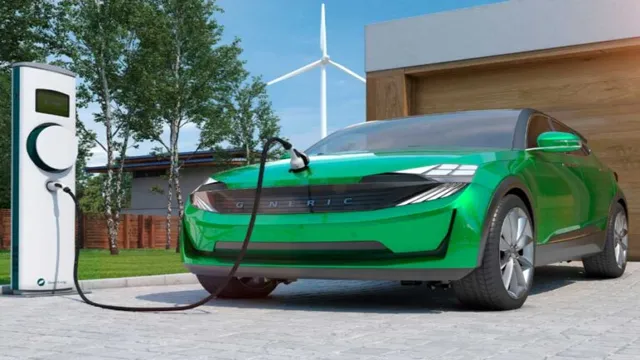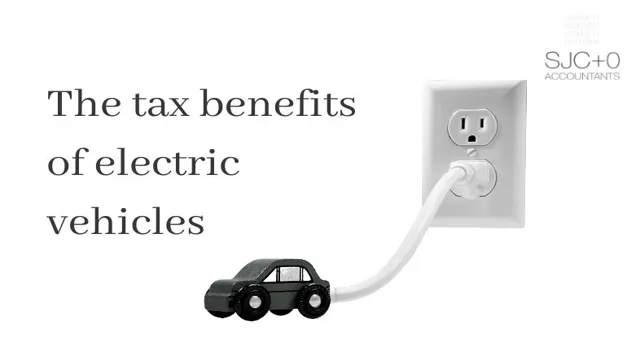Powering the Future: How Electric Cars are Boosting the Economy and the Environment
Electric vehicles are becoming more common on the roads every day, and many people are curious about their economic impact. The use of electric cars can have a significant effect on the economy, from reducing global emissions to creating jobs in the automobile and energy industries. In this blog post, we will discuss the economic impact of electric cars and how it could affect the future of transportation.
Are electric cars just a fad, or will they revolutionize the auto industry and the economy as a whole? Let’s explore the possibilities and find out.
Environmental Benefits Of Electric Vehicles
Electric cars can benefit the economy in many ways, particularly when it comes to the environment. By using electricity to power the vehicle rather than fossil fuels, electric cars have the potential to reduce air pollution and greenhouse gas emissions. This not only helps to mitigate the negative effects of climate change, but it also improves public health by reducing the number of harmful pollutants in the air.
Additionally, electric cars can save drivers money in fuel costs, which can be a significant benefit to the economy overall. As more people shift towards electric vehicles, there is also the potential for job growth in the electric vehicle industry, from manufacturing to maintenance and repair. Overall, the environmental benefits of electric cars can have positive impacts on both the economy and public health.
Reducing Dependence on Fossil Fuels
Electric Vehicles (EVs) Electric vehicles have several environmental benefits that make them a better choice compared to conventional gasoline-powered cars. Firstly, EVs run on electricity, which is cleaner than fossil fuels and produces fewer emissions. This reduces air pollution, improves air quality and reduces greenhouse gas emissions that cause climate change.
Secondly, as electric cars are battery-operated, they don’t require frequent oil changes and the disposal of used oil, reducing waste and pollution. Lastly, electric vehicles are also quieter than gasoline cars, reducing noise pollution. By reducing dependency on fossil fuels for transportation, we can significantly reduce our carbon footprint and promote a cleaner and greener future.
Switching to electric vehicles and supporting policies that promote their use is an excellent step towards a sustainable future.
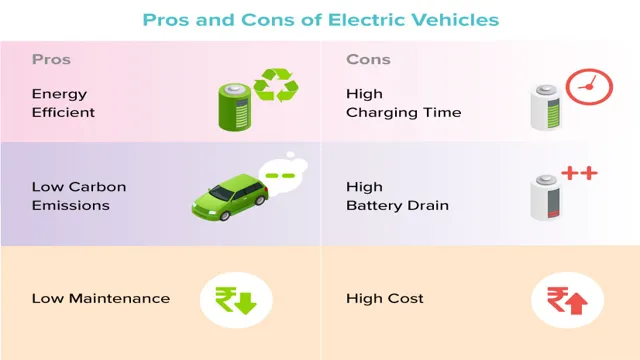
Reducing Vehicle Emissions
Electric vehicles have numerous environmental benefits compared to gas-powered vehicles, making them an excellent choice for reducing vehicle emissions. One of the most significant benefits of electric vehicles is their zero-emission powertrain, which means they emit no greenhouse gases or pollutants into the atmosphere. This reduction in emissions is not only better for the environment but also contributes to improving public health.
Additionally, charging electric vehicles with renewable energy sources, such as solar or wind power, further reduces their environmental impact. Moreover, electric vehicles are quieter and produce less noise pollution, significantly reducing the noise levels in urban areas. These environmental benefits make electric vehicles a crucial solution for battling climate change and creating a healthier future for generations to come.
Positive Effects on Employment
When it comes to the economy, electric cars can have a massive positive impact on employment. This is because the production and distribution of electric cars require different skill sets compared to traditional gasoline cars. More specifically, electric cars require a higher level of technology and innovation, as well as a more diverse range of manufacturers and suppliers, leading to increased job opportunities for people with various skills and backgrounds.
This shift towards electric cars could also potentially create jobs in the renewable energy industry, since electric cars run on electricity-powered batteries that can be charged by solar or wind power. All in all, electric cars can benefit the economy in many ways, and with the right policies, they could stimulate sustainable growth, job creation, and innovation while reducing our carbon footprint.
Job Creation in the Auto Industry
The auto industry has a significant impact on job creation in the United States. Not only does it provide jobs directly within the industry, but it also supports industries such as steel, rubber, and electronics that produce the parts and components of a vehicle. The manufacturing and assembly of automobiles alone employ over 2 million people in the country.
These jobs are not limited to specific areas, as auto plants are spread across the nation. They offer a wide range of employment opportunities from assembly line workers to salespeople, engineers, and analysts. Automotive dealerships also provide employment for sales representatives, mechanics, and administrative positions.
The positive effects of job creation in the auto industry have a ripple effect throughout the economy. As more people are employed in the industry, they have more disposable income to spend on housing, groceries, and other essential items. Local businesses benefit from increased sales, and the overall economy thrives.
In summary, job creation in the auto industry not only provides employment opportunities but also strengthens the economy.
Increased Demand for Skilled Labor
The current job market is witnessing an increase in demand for skilled labor. This trend is beneficial for many job seekers and workers who have acquired specific skills in various fields. The positive effects of this shift in employment demand are immense, as it not only creates opportunities for individuals to showcase their talents but also leads to the growth of businesses and the economy.
With more demand for skilled labor, individuals can earn higher wages and secure job stability, making the job market more attractive than ever before. Furthermore, as businesses harness the talent of skilled labor, they can prosper and expand their operations. In conclusion, the demand for skilled labor is a positive trend that creates opportunities for job seekers, supports businesses, and strengthens the economy.
Development of New Industries
The development of new industries has proven to have a positive effect on employment, as it creates new job opportunities and reduces unemployment rates. For instance, the rise of the technology industry has led to increased demand for skilled workers in fields such as software development, data analytics, and artificial intelligence. These new job opportunities not only provide employment for the skilled workers but also create a ripple effect by generating more jobs in related industries such as marketing, sales, and customer support.
Furthermore, the establishment of new industries encourage entrepreneurship and innovation, leading to the creation of new businesses and ventures. It is vital for governments and organizations to invest in the development of new industries to enable job growth and economic prosperity. By supporting and empowering entrepreneurs and innovators, we can foster economic growth and chip away at the unemployment rate.
Cost Savings for Consumers and Businesses
Electric cars do benefit the economy in many ways, including cost savings for both consumers and businesses. For consumers, opting for an electric vehicle means a reduction in fuel costs since electricity is generally cheaper than petrol or diesel. Moreover, electric cars usually have fewer maintenance requirements compared to conventional vehicles, which means lower servicing, repair, and replacement costs.
Additionally, electric cars benefit businesses through lower operating costs, reduced fuel consumption, and increased efficiency. For instance, companies can install electric vehicle charging stations at their premises, saving their employees the cost and time involved in travelling to refuel their vehicles. Electric cars also offer environmental benefits, such as reducing carbon emissions, which translates to healthier air quality and reduced public health costs associated with air pollution-related health problems.
Finally, the adoption of electric cars spurs innovation and the creation of new jobs in the renewable energy industry, which, in turn, drives economic growth. Overall, the economic benefits of electric cars cannot be underestimated, and with more and more people switching to these vehicles, the future looks bright for both the economy and the environment.
Lower Operating Costs
Lower operating costs can be of great benefit to both consumers and businesses, with the potential to save a significant amount of money over time. For consumers, lower operating costs can come in the form of energy-efficient products, such as appliances and vehicles that require less fuel. These products not only save money on energy bills, but they also contribute to a more sustainable environment.
For businesses, lower operating costs can be achieved through various methods, such as optimizing supply chain processes, implementing cost-effective technology solutions, and utilizing energy-efficient equipment. These cost savings ultimately contribute to increased profits and the ability to invest in growth and innovation. By taking steps to lower operating costs, consumers and businesses can achieve financial stability and sustainability while also doing their part to protect the planet.
Tax Incentives and Credits
Tax incentives and credits offer a great opportunity for both individuals and businesses to save money on their taxes. For example, the Energy Efficiency Tax Incentives for homeowners offer credits for renovations that improve a home’s energy efficiency, such as upgrading to efficient insulation or installing solar panels. On the business side, there are tax incentives for investing in research and development, hiring veterans and individuals with disabilities, and even starting a business in an economically disadvantaged area.
These tax incentives can add up to significant cost savings for both individuals and businesses, making them an attractive option for those looking to reduce their tax burden. By taking advantage of these credits and incentives, consumers and businesses can not only save money but also invest in a more sustainable future.
Government Investment in EV Infrastructure
Investing in electric vehicle (EV) infrastructure can benefit the economy in numerous ways. Firstly, it promotes job creation, from the construction of charging stations to the maintenance and operation of the facilities. Governments can also incentivize companies to produce more EVs, creating jobs in the automotive industry.
Secondly, widespread adoption of electric vehicles can reduce our dependence on foreign oil imports, leading to increased energy independence. This can improve our national security and save money on fuel costs. Furthermore, as more people switch to EVs, there will be a reduction in harmful emissions, leading to improved air quality and public health.
Governments can also benefit financially by taxing EV sales and charging station use, generating revenue to fund other public projects. Overall, investing in EV infrastructure is a win-win situation for both the economy and the environment.
Conclusion
In conclusion, the idea that electric cars benefit the economy is no longer up for debate – it’s a proven fact. From job creation to reduced dependence on foreign oil and increased national security, the benefits of electric vehicles go beyond just the environmental impact. As we continue to transition towards a cleaner, more sustainable future, the electric car industry is poised to be a major player in driving economic growth and prosperity.
So buckle up, folks – it’s going to be an electrifying ride!”
FAQs
What economic benefits do electric cars offer?
Electric cars offer several economic benefits, including lower fuel and maintenance costs, tax incentives, and job creation in the manufacturing and charging infrastructure industries.
How do electric cars impact the job market?
The rise of electric cars creates job opportunities in the manufacturing and charging infrastructure industries. Additionally, it may impact traditional automotive jobs as the industry shifts towards electric vehicles.
What is the environmental impact of electric cars on the economy?
Electric cars reduce greenhouse gas emissions and air pollution, which can lead to improved public health and decreased healthcare costs. Additionally, reducing dependence on foreign oil can improve national security and decrease oil price volatility.
How do government incentives for electric cars affect the economy?
Government incentives for electric cars, such as tax credits or rebates, can encourage consumer adoption and stimulate demand for electric vehicles. This can lead to increased investment in the manufacturing and charging infrastructure industries and create jobs.
